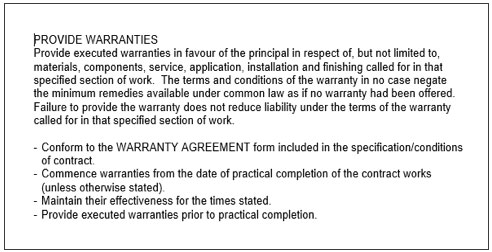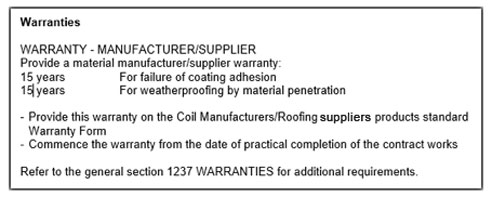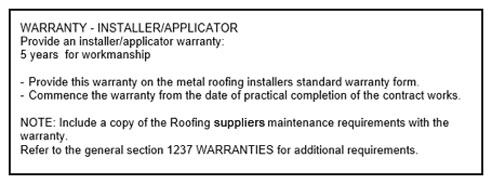Current and emerging legislation makes it increasingly clear that the performance of construction materials and systems and the work performed installing them must meet suitable criteria. We usually refer to these criteria as either a Warranty or Guarantee and the terms are often transposed. Although similar, however, they have different meanings which you must be clear on in your documentation.
Terminology – precision is key.
A Guarantee is a promise of quality & durability, with regular use, and usually applies to simple whole items, from a TV to an entire building.
A Warranty is a guarantee plus acceptance of liability & defect correction. This is more often applied to complex systems (like construction systems that are part of a building) in particular situations over specified periods.
Durability means Durability to NZBC B2, which describes the specific technical performance of a material and its resistance to complete failure over a defined period subject to proper maintenance.
Liability describes the accountability of persons or organisations for any failure of materials, systems or construction.
Definitions
GUARANTEE TYPES
Different types of Guarantees may be applied, including Commercial warranties, Contractual warranties, Legislated guarantees and the Fair Trading Act.
- Commercial guarantee – provided by private enterprise (e.g. MasterBuild Guarantee)
- Legislated guarantee – The Consumer Guarantees Act. The Act applies to residential only and is limited to the services provided (not the buildings). It covers:
- Work to be done with reasonable care and skill
- Materials to be of acceptable quality & fit for purpose
- Work completed in a timely way
- The Fair Trading Act – the Act protects consumers from being misled about products or services. Refunds and compensations are available if there were any misleading claims for:
- Work needed when it was unnecessary
- The contractor/tradesperson purporting to belong to a trade association or implying they have some industry approval
WARRANTY – TYPES
Different types of Warranties may be applied, including Commercial warranties, Contractual warranties, and warranties enforced by legislation.
- Commercial warranties – usually from manufacturer/supplier, these may be provided:
- As of right or
- Required by Specification
- Contractual warranties – These warranties are from the contractor or sub-contractor and are required as set out in the contract or specification for say:
- A Contractors 2 year weather-tightness and water-tightness warranty
- Installers or applicators warranty of workmanship
- Legislated warranties – there are warranties required by the Building Act, under Part 4A: Consumer rights and remedies in relation to residential building work. The Act;
- Has implied warranties in residential contracts (builder/client)
- Has remedies for breaches of implied warranties
- Requires the contractor to remedy defects notified within one year of completion
Masterspec System - examples of Commercial/Contractual warranties
MASTERSPEC GENERAL REQUIREMENT

WARRANTY COMMERCIAL

WARRANTY - INSTALLER/APPLICATOR

Implied warranties under the Building Act
IMPLIED WARRANTIES - RESIDENTIAL BUILDING CONTRACTS
- Implied warranties apply to Building Contracts or sale agreements (subject to Contracts) with on-sellers. They warrant that;
- The building work will be carried out competently in accordance with the contract plans, specifications and consent.
- Materials will be fit for purpose and to be new (unless stated otherwise).
- The work will meet all legal requirements.
- The work will be done with reasonable care and skill and completed by the date (or within the period) specified in the contract. Or, if no date or period is specified, within a reasonable time.
- The residence will be suitable for occupation on completion.
IMPLIED WARRANTIES - REMEDIES
If there has been a breach in a written or verbal contract, the client may require the builder to fix the work and repair or replace defective materials. If the builder does not fix within a reasonable time, the client may have work done by someone else and recover costs from the builder or can cancel the contract.
Where a breach of warranty is substantial or cannot be fixed, the client may get compensation from the builder for any reduction in the value of the building work below the price they paid, or they can cancel the contract.
- The Client may also obtain damages from the builder for any loss or damage resulting from the breach (other than loss or damage through a reduction in the value).
- Builders can't contract out of their Warranty obligations. The legislation applies to the work of the builder, as well as employees and subcontractors the builder is responsible for.
An owner of the building or land in respect of which building work was carried out under a contract to which this section applies may take proceedings (Adjudication, Arbitration, WHRS) for a breach of any of the warranties set out in section 362J, whether or not that person was a party to the contract.
How long does liability last?
LIABILITY - LIMITATION ACT 2010
Limitation laws prevent certain legal claims being brought against a person or company after a defined period. They provide a defence against old claims and give certainty to legal liability for past events. There are three legislative channels to establish most construction-related liability limitations;
- The New Zealand Building Act - section 393 Limitation defence – this brings in the Limitation Act for civil proceedings arising from:
- Building work - design, construction, alteration, etc
- Performance of a function under the Building Act
- Has a ten year (long stop) time limit from the date of omission
- May include implied warranties (for residential only)
- Limitations Act 2010 – for building related matters the time scales generally are:
- Limited to 6 years from discovery (but extended to)
- Ten year-long stop for "reasonable discoverability" (under Building Act)
- Weathertight Homes Resolution Services Act (WHRS):
- Ten year-long stop, generally
Note: These limitations don't always apply to material or product performance. These can be subject to more extended performance requirements of Durability (under the Building Act, Building Code and other legislation) and specific warranty period.